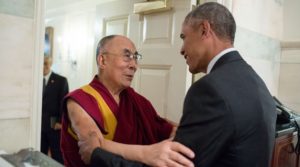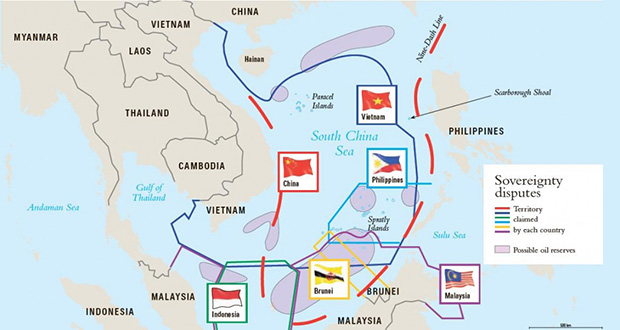China on Wednesday warned U.S. President Barack Obama against meeting with the Dalai Lama at the White House, saying that hosting the exiled Tibetan spiritual leader could damage mutual trust.
Obama has met the Dalai Lama several times before and calls the monk, who is revered by Tibetans but portrayed by Beijing as a dangerous separatist, ‘a good friend.’
The tete a tete, planned for Wednesday will – as usual – take place behind closed doors in an effort to avoid angering China, which accuses the Nobel peace laureate of using ‘spiritual terrorism’ to seek independence for Tibet.
(Agence France-Presse, June 15, 2016)
 It is self-evident that no U.S. president can allow China to dictate who gets invited to the White House. Yet this has not stopped China from repeatedly warning U.S. presidents against meeting with the Dalai Lama.
It is self-evident that no U.S. president can allow China to dictate who gets invited to the White House. Yet this has not stopped China from repeatedly warning U.S. presidents against meeting with the Dalai Lama.
Here is how I framed its antic but foreboding futility in this respect in “World Beware, China Calling In (Loan-Sharking) Debts,” February 3, 2010.
__________________
The Chinese can be forgiven for thinking that even President Obama would heed their extraterritorial warning against meeting with Tibetan spiritual leader the Dalai Lama. They were undoubtedly emboldened last year when Obama appeared to do just that; specifically, when he snubbed the Dalai Lama on the eve of his (Obama’s) first state visit to China.
But the day of reckoning for this warning (for Obama and the Chinese) is drawing nigh. The White House announced yesterday that Obama intends to welcome the Dalai Lama later this month. On cue, the Chinese reacted variously like an angry parent disciplining a willful child and a loan shark dealing with a delinquent debtor…
I applaud Obama for calling China’s bluff. Not least because any real attempt to squeeze the United States financially would amount to an unprecedented case of cutting off one’s nose to spite one’s face. After all, the U.S. market is even more indispensable to China’s economic growth than China’s credit is to the U.S.’s…
This episode of naked bullying should serve as a warning to all countries around the world that are not just lapping up China’s largesse, but heralding it as a more worthy superpower than the United States. After all, China is spitting imperious and vindictive fire at the rich and mighty United States over a relatively insignificant matter like meeting with the Dalai Lama. So just imagine what it would do to a poor and weak country in a conflict over a truly significant matter.
__________________
 Sure enough, Obama met with the Dalai Lama back in 2010 and three times since then, including two weeks ago today as planned.
Sure enough, Obama met with the Dalai Lama back in 2010 and three times since then, including two weeks ago today as planned.
Except that he undermined America’s superpower prerogative each time by meeting with him “behind closed doors” – even making him use the back door. Rather smacks of the cowardly Nicodemus meeting with Jesus only “at night,” no?
Yet Obama stands apart from far too many world leaders who have heeded China’s warning against meeting with this exiled Buddhist monk.
Western leaders are heeding China’s warning against meeting with the Dalai Lama in any official capacity, making a mockery of their condemnation of the brutal crackdown on Tibetan monks. In fact, UK Prime Minister Gordon Brown appeased the Chinese by refusing to meet with him at No. 10, choosing instead to meet only at the residence of the Archbishop of Canterbury. This enabled Brown to claim that he was meeting the Dalai Lama ‘in a spiritual rather than political capacity.’
(“Punishing China for Its Brutal Crackdown on Tibet? Hardly…,” The iPINIONS Journal, July 28, 2008)
I have condemned this venal kowtowing in many commentaries. But in “South Africa Joins Ranks of Countries ‘Selling Sovereignty to China,” October 3, 2014, I offered this resignation:
It came as no surprise when China began demanding that countries utterly shun the Dalai Lama pursuant to its national interest… [It] has just prevailed upon South Africa to do just that…
Alas … the United States heads a list of precious few countries with the military and financial power to reject China’s inducements to sell their sovereignty … without fear of reprisals.
 But nothing indicates how petty and punitive China can be in this respect quite like this:
But nothing indicates how petty and punitive China can be in this respect quite like this:
Lady Gaga has reportedly been added to a list of hostile foreign forces banned by China’s Communist party after she met with the Dalai Lama to discuss yoga.
The American pop singer, who has sold more than 27m albums, met the exiled Tibetan spiritual leader on Sunday before a conference in Indianapolis.
The meeting sparked an angry reaction from Beijing, which has attacked the spiritual leader as a ‘wolf in monk’s robes.’
(London Guardian, June 27, 2016)
This vindicates my warning that, despite its rise as a superpower, China’s congenital insecurity could still cause it to strike out in imperious and vindictive ways against enemies, real and imagined, formidable and nominal – no matter how petty the provocation. Never mind that Lady Gaga seemed too busy trying to seduce the celebrated monk (with her see-through, tit-baring top) to worry about any consequence meeting with him portended.
All the same, China’s (over)reaction to her puts into context its warning to other countries against challenging its territorial claims to waters and islands in the South China Sea. Unlike efforts to make the Dalai Lama persona non grata, however, its efforts to have dominion over this sea is “a truly significant matter.”
By way of background, here is how the Philippines framed this territorial dispute a few years ago, when it sought declaratory judgment and injunctive relief from the UN-backed court of arbitration in The Hague, pursuant to the U.N. Convention on Law of the Sea (UNCLOS):
The South China Sea must comport with UNCLOS, which would invalidate China’s nine-dash line; classifies maritime features occupied by China as rocks, low tide elevations, or submerged banks, but not islands; and declares the Philippines’ right to operate inside of its EEZ and continental shelf as outlined by UNCLOS without Chinese harassment.
(CSIS, January 22, 2013)
Of course, the Philippines is just one of six regional countries seeking similar judgment and relief. The others are Japan, Taiwan, Vietnam, Malaysia, and Brunei. Each is trying to prevent China from unilaterally staking claims over territorial waters that are rich in fisheries, natural gas, and/or oil.
Meanwhile, China is trying to prevent all countries, including the United States, from navigating commercial shipping lanes in the South China Sea without acknowledging and giving effect to its territorial claims.
Reports are that the court will hand down its ruling in Philippines v. China any day now. But chances are that China will not abide any U.N. ruling against it with respect to the South China Sea, just as the United States has not abided WTO rulings against it with respect to offshore gambling. I decried the latter “Antigua v. United States re: Online Gambling … Continues,” January 30, 2013.
In any event, here is how I sought to allay fears about this seemingly ominous territorial dispute in “China and Japan in Falklands-Like Dispute,” August 23, 2012.
__________________
War between China and Japan over the Senkaku Islands would make the war between Argentina and Britain over the Falkland Islands seem like a barroom brawl between mindless drunks. Not least because the United States would be compelled to honor its treaty obligations to defend Japan…
[But] notwithstanding the mob-like passions of their respective nationalists, I’m sure Chinese and Japanese leaders alike are mindful of the folly of fighting a war over desolate islands that could only end in a pyrrhic victory at best.
__________________
Not to mention that China will be no more successful today in building islands to protect its territorial claims at sea than it was thousands of years ago in building walls (later the Great Wall) to protect its territorial claims on land. Those walls did not prevent northern nomadic tribes from invading; these islands will not prevent the United States and other countries from navigating.
Granted, less powerful countries like Brunei and Vietnam might face Chinese harassment if they attempt to fish or drill in these disputed waters. For them there’s a hidden dragon behind that paper tiger…. But Japan, Taiwan, and the Philippines have collective defense agreements with the United States, which make them much less vulnerable.
 But I commend Obama for ignoring China’s warnings – complete with imperial force to counter China’s imperial claims. For, instead of engaging in a battle of words, he deployed an armada of battleships to navigate through what China claims are its territorial waters, daring Chinese leaders to do something about it.
But I commend Obama for ignoring China’s warnings – complete with imperial force to counter China’s imperial claims. For, instead of engaging in a battle of words, he deployed an armada of battleships to navigate through what China claims are its territorial waters, daring Chinese leaders to do something about it.
A Chinese observation ship shadowed the U.S. aircraft carrier John C. Stennis in the Western Pacific on Wednesday, as it joined warships from Japan and India for drills close to waters Beijing considers its backyard, the carrier’s commander said.
The show of U.S. naval power comes as Japan and the United States worry China is extending its influence into the Western Pacific with submarines and surface vessels as it pushes territorial claims in the neighboring South China Sea, expanding and building on islands.
China has been angered by what it views as provocative U.S. military patrols close to the islands; the United States says the patrols are to protect freedom of navigation.
(Reuters, May 15, 2016)
This vindicates my attempt to allay the fears I referenced in my August 2012 commentary quoted above. After all, China’s “observation ship” poses no greater deterrence to U.S. warships than a clan of hyenas poses to a herd of elephants.
Then, of course, there’s the hypocrisy inherent in China complaining about the United States violating its territorial waters, while its neighbors are complaining about it violating theirs:
A Chinese navy reconnaissance vessel entered Japanese territorial waters near Kuchinoerabu Island off Kagoshima Prefecture early Wednesday morning — the first time since 2004 that a Chinese military ship has done so.
Wednesday’s incursion comes just under a week after a Chinese naval frigate entered the contiguous zone just outside Japan’s territorial waters near the disputed Senkaku Islands in the East China Sea…
The ministry said it warned the Chinese ship to exit the territorial waters — generally defined under international law as within 12 nautical miles (22 km) of a nation’s land border — prompting it to leave the waters south of Yakushima Island.
(Japan Times, June 15, 2016)
Therefore, here’s to the United States calling China’s bluff at every turn. Especially given that, despite its bellicose protests, China has shown no greater willingness to risk political, economic, or military confrontation with the United States to defend (extra)territorial waters than to ostracize an itinerant monk.
Namaste.
Related commentaries:
World beware…
Countries selling sovereignty…
China and Japan…
US and Antigua…
